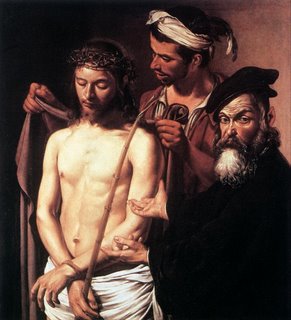
THE DEVOTION OF THE "THREE HAIL MARYS"
Its Basis
The Blessed Trinity has crowned the Blessed Virgin Mary with three diadems: God the Father had endowed the Blessed Virgin with Power in Heaven, on earth and in hell; God the Son had endowed her with Wisdom of God and of His creatures; God the Holy Spirit has endowed her with Love for God and for man. Through the devotion of the "Three Hail Marys", we remember these three crowns and honor her for this God-given privilege; thus the purpose of this devotion is to give glory to God. This was revealed by Our Lady herself to St. Matchilda.
The Vision of St. Gertrude
In a vision, St. Gertrude saw the following: Three Beams of Light issue from the Heart of the Three Divine Persons and penetrate into the Heart of the Blessed Virgin Mary. Then, They return to Their Source in the Blessed Trinity. Herein lies the admirable compendium of the entire Marian Theology. In this vision, Mary is presented to us as "the splendor of the Eternal Light, the mirror of the Divine Majesty and the image of the Infinite Goodness", receiving and reflecting all the graces of the Blessed Trinity. Through the devotion of the "Three Hail Marys", Our Lady shows us her gratitude to the Blessed Trinity, reminding us of this august Mystery.
Moreover, this devotion enables us to honor the Mother of God in a suitable manner, for -- as Our Lady herself revealed to St. Mathilda -- the "Hail Mary" is the best prayer we can offer to Our Lady to recall her God-given privilege as Mother of God and to give her due honor for it.
Practiced and Recommended
Many great saints have practiced and recommended the devotion of the "Three Hail Mary". Here are the names of but a few of them: St. Leonard of Port Maurice, St. Bruno, St. Bonaventure, St. John Berchmans, St. John Baptist Mary Vianney (Cure of Ars), St. Anthony of Lisbon and of Padua, St. Stanislaus Kostka, St. Louis Marie Grignion de Montfort, St. John Joseph of the Cross, St. John Baptist de Rossi, St. Gerard Majella, St. Gabriel of Our
Lady of Sorrows, Blessed Marcellinus Champagnat, and, above all, the great Marian doctor St. Alphonsus Liguori who, in his writings recommended this devotion about twenty times.
As a result, this devotion has been spreading, and we are reminded of it in many ways: at shrines, in churches and chapels, through association and sodalities, through novenas, pictures, statues and medals, and especially by the innumerable graces and favors received through the practice of this devotion. No doubt, one day in the near future, it will be numbered among
the universally-known important Marian devotions. Moreover, various Popes have indicated that they favor this devotion: Some (like Pius IX, Leo XIII and St. Pius X) have granted special
indulgences for the practice of this devotion. Others (since Urban II at the Council of Clermont in 1095) have proposed it as a means for obtaining the triumph of the Church; while still others (like Leo XIII and St. Pius X) have ordered its recitation after the Mass for the same intention. (This was the reason the "Three Hail Marys" were recited after the Low Masses before
the Liturgical Reform.) St. Pius X said: "This devotion will save Mexico", and so he recommended all the faithful to practice it.
Innumerable Fruits
"Astonishing conversions, increase in virtues, cure of the sick, temptations conquered, business difficulties solved, holy death and salvation." (This is the promise made by the Blessed Virgin to St. Matchilda). The "Three Hail Marys", are "the best safeguard for chastity" (in the words of St. Alphonsus Maria Liguori). This statement was recorded and attributed to St. Alphonsus Maria Liguori by St. Pius X; "that it is true, has been confirmed by our experiences as well as those of many missionaries" (according to Frassinetti). Even the number of graces and favors obtained through the practice of this devotion show us just how pleasing it is to the
Blessed Virgin Mary.
Devotion for Everyone
This devotion is suitable for everyone: For sinners, it is a classic example of a devotion approved especially for them by the Church. Even if the complete renewal in our way of life does not occur immediately, at least a great change for the better will be noted. Our faithful perseverance in this practice will succeed in obtaining the complete change, sooner or later, through Our lady's intercession. (This is what St. Alphonsus Maria Liguori wrote about this devotion.) Of course, it is understood that the person who is praying for the favor -- even if he/she be a great sinner -- must have pure intentions and good will, and pray with great attention, fervor and constancy. For those who progress in spiritual life, the "Three Hail Marys" are powerful arms against temptations, especially those against purity. "From my
wide experience, I know that boys and girls who faithfully honor Mary, do not usually commit serious sins" (according to Frassinetti). And this devotion is really very easily practiced, for its very brevity makes it suitable for everyone, however busy they may be, since it does not even take one minute to pray the "Three Hail Marys". (It takes only some 40 seconds.) Therefore, of the 1,440 minutes in each day, are we unable to devote about one minute and half per day to reciting the "Three Hail Marys" in the morning and at night in order that we may obtain our eternal salvation?!
How to Pray the "Three Hail Marys"
Although the devotion of the "Three Hail Marys" is very easy, there are certain conditions which we should observe:
1. Our intentions must be pure, and we must have good will.
2. We must pray with attention, fervor and constancy.
3. With each "Hail Mary", we must have the intention of honoring one of the three privileges granted by the Blessed Trinity to the Blessed Virgin Mary: POWER, WISDOM and MERCY.
4. Since the main aim of these "Three Hail Marys" is our sanctification and salvation, we should add one of the ejaculations which recall this aim. Some of them had been recommended and indulgenced by Leo XIII or by St. Pius X.
Here are some examples:
a) "Mary, my Mother, keep me free from mortal sin during this day" or "during this night" (as the case may be).
b) "O Mary, by your Immaculate Conception, keep my body pure and my soul holy."
c) "O Mary, conceived without sin, pray for us who have recourse to thee and also for those who do not have recourse to thee, especially for the enemies of the Church."
Its Effectiveness
Here is the personal testimony of a sinner who used the devotion with good results: "For the last three years, I have been the slave of a bad habit against the virtue of purity. How could I get rid of this terrible passion? I tried every means available, but all proved useless. I used to give in to very serious sins and even to sacrileges. This was most disheartening. "Then, one day, someone recommended to me the devotion of the "Three Hail Marys". And now, it is not yet quite one month since I started to pray the "Three Hail Marys" every morning and every night without fail. I cannot explain what has happened within me, but I do know and can assure you that, since the very first moment, it has produced wonderful results within me: I have not succumbed to the impure temptations since then. When I have been weak and just about ready to succumb, something or another has happened which has stopped me from giving in; and, indeed, I do know that it was something stronger than my desire of sinning."
Fatal Delay in Explaining
Although the recitation of the "Three Hail Marys" was recommended after Low Masses, at the beginning of each Rosary, etc., the importance of this devotion was not explained to the faithful on a wide scale. Therefore, most Catholics did not know its meaning or its importance, and so, they did not pray them with the proper dispositions. As a result, anti-Christian forces -- like Atheism, Communism, etc. -- have been able to organize secret societies to attack the Church.
Let us hasten to start practicing this devotion of the "Three Hail Marys" every morning and every night! Let us not put it off till tomorrow! Moreover, let us introduce this devotion to our friends and relations and urge them to recite the "Three Hail Marys" daily, every morning and every night! Through the practice of this simple devotion we may be led to study the Message of Fatima in greater detail, and so we may lead a life of greater prayer, sacrifice and consecration to the Immaculate Heart of Mary. The suppression of the anti-Christian doctrines, the conversion of sinners and of Russia, and -- above all -- peace in the world depends on our
obtaining the necessary graces from God through our prayers and sacrifices!
Read whole post......
 Avoiding superfluity of words
Avoiding superfluity of words







































